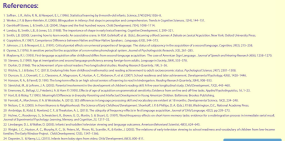Group Accuses ‘Your Baby Can Read’ Creators Of Violating False Advertising Settlement With ‘Your Baby Can Learn’
Nearly two years ago, the creators of the popular Your Baby Can Read! series of videos put an end to a Federal Trade Commission deceptive advertising complaint by agreeing to cease making unsubstantiated claims about any product that purports to teach kids how to read. But the advocacy group that first spurred the FTC into action says that the creators of this program are violating that 2014 deal.
For more than a decade, Dr. Robert Titzer made claims that the program he created gave “infants and children an early start on academic learning, allowing them to perform better in school and later in life than children who did not use the program,” or that “Scientific studies prove that Your Baby Can Read! teaches infants and children to read.”
And parents believed these claims, earning Titzer’s company hundreds of millions of dollars in sales. However, the Campaign for a Commercial-Free Childhood was skeptical about the supposed scientific underpinnings of the DVD-based learning program — which claimed to teach children as young as nine months to be able to read — and urged the FTC to investigate.
In 2012, the FTC filed a complaint against Titzer and his Infant Learning Company, alleging that their advertising and marketing claims were not backed up by the science. Two years later, they finally settled, agreeing to pay $300,000 of a $186.4 million judgment and to stop selling educational products unless they can prove they are effective.
But the CCFC says that Titzer’s new products, including a series called Your Baby Can Learn!, appear to be the old program under a new name.
In a letter [PDF] sent today to the FTC, the CCFC alleges that Infant Learning Co. is leaning on the same studies for Your Baby Can Learn! that the FTC said were insufficient for marketing Your Baby Can Read!.
On the company’s “About” page, ILC explains:
“Your Baby Can Learn! (called Your Baby Can Read! in the studies) is one of the most-studied baby products in the world, and none of the studies show any negative effects related to watching or using the program. Instead, the studies consistently find that using Your Baby Can Learn! for at least 6 months on a regular basis helps babies, toddlers, and preschoolers learn according to all but one of the lead researchers. However, according to the parents in that study their babies learned written language and vocabulary skills. The parents in every study where they were questioned said their babies learned from using the program.”
The CCFC notes several problems with the above statement. First, that the new product is apparently the same as the one that got Titzer into trouble.
Second, that it does not actually cite a single study, even though it implies that there are multiple pieces of research. “To the extent that any studies exist, they are likely the same internal studies reviewed by the FTC and found insufficient prior to filing its 2012 complaint,” says the letter.
Then there’s the concluding bit about parents saying their babies learned. The CCFC contends that “subjective surveys of parents do not constitute competent and reliable scientific evidence as required by Section 1 of the [FTC] Order requiring objective evaluation by qualified persons.”
It’s the company’s repeated use of “science” on its website and in its marketing that troubles CCFC. Titzer’s new products are described as “innovative, science-based” using the doctor’s “science-based approach,” while ILC touts the company’s “Scientific Approach to Early Learning” with the use of graphs and talk of a “multisensory learning methodology.”
“These claims misrepresent that the benefits of these products are scientifically proven,” alleges the CCFC.
 The letter also points out that the “About Our Approach” page on the ILC website concludes with a list of two dozen “References,” a list of published scientific studies on childhood education.
The letter also points out that the “About Our Approach” page on the ILC website concludes with a list of two dozen “References,” a list of published scientific studies on childhood education.
However, CCFC says that not a single one of these studies actually looked at, or even references any of Titzer’s products.
“These studies do not show any benefits from these specific products,” reads the letter, which later adds that “Titzer provides no evidence that he has conducted the examinations and testing required by the Order to exercise his endorsement. At best, Titzer offers a series of generic scientific articles and studies that support general early learning theory.”
In a statement, CCFC’s Executive Director Josh Golin says, “There is no evidence that videos are an effective method of teaching babies anything, let alone a complex skill like reading. Once again, we need the FTC to take action to protect our youngest and most vulnerable children from being lured to screens under false pretenses.”
We’ve reached out to ILC for comment on this story and will update if we hear anything back.
Want more consumer news? Visit our parent organization, Consumer Reports, for the latest on scams, recalls, and other consumer issues.

